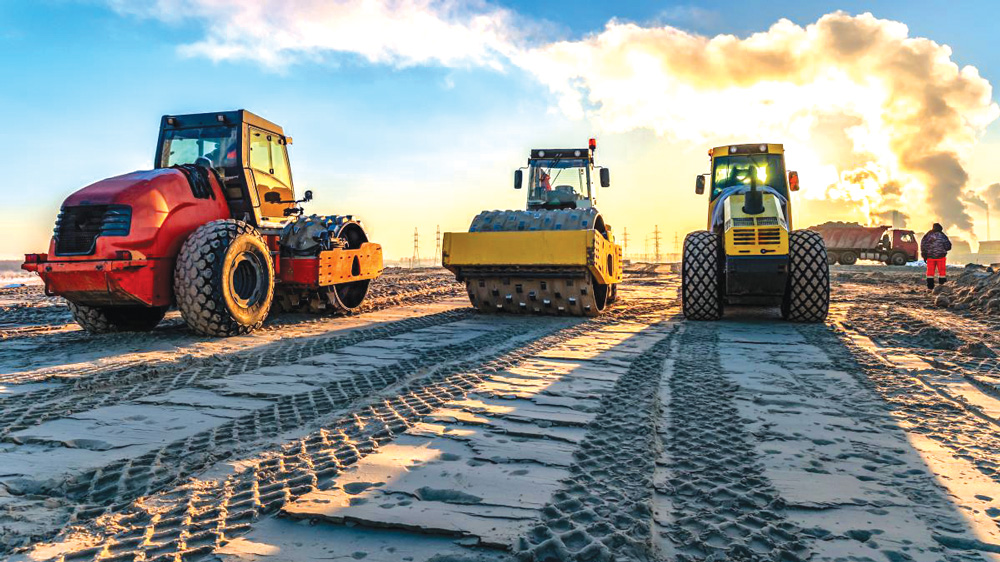CERA Aims To Elevate Rentals’ Penetration To 50-60% Within Two Years.

Satin Sachdeva
Founder and Secretary General, CERA (Construction Equipment Rental Association), and MD, Equipment Planet
How do you see Excon as a platform for presenting technologies and services?
Excon, the exhibition on construction equipment and construction technology, serves as a pivotal platform for showcasing the latest machinery, cutting-edge technologies and services within the construction sector. This event significantly enhances the Indian construction equipment industry through various means:
Latest innovations: Excon provides an esteemed platform for rental companies to showcase their latest equipment range, featuring new technologies, product launches, and innovations in the construction equipment sector.
Industry insights: Excon offers a comprehensive overview of industry trends and insights. Rental companies and other major stakeholders can gain valuable knowledge about emerging technologies, market trends, and best practices, ensuring they remain competitive and well-informed amidst a rapidly transforming world.
Networking opportunities: Serving as a central meeting point for industry professionals, including manufacturers, suppliers, contractors, spare part dealers, financiers, and technology providers, Excon facilitates networking, collaboration, and the exchange of ideas. This contributes to overall industry growth, and increased participation by rental companies can enhance their presence as major stakeholders in the infrastructural sector.
Business expansion: Both domestic and international participants can leverage Excon to expand their market presence, exchange ideas and practices, explore new business opportunities, and establish connections with potential clients and partners. The presence of numerous foreign companies makes Excon a prime platform for collaboration.
Knowledge awareness: Through seminars, conferences, and workshops led by industry experts, Excon facilitates knowledge transfer, contributing to skill development, awareness of advancements, and a deeper understanding of the evolving needs of the construction sector.
Product launch: Manufacturers often choose Excon as a platform for launching new products and services. This opportunity capitalises on the event’s visibility to attract attention from potential buyers, including equipment rental companies, investors, major corporations, construction companies, and industry stakeholders.
Government regulatory engagement: Excon creates opportunities for industry representatives to engage with government officials and regulatory bodies, fostering discussions on policy issues, regulatory frameworks, and addressing challenges faced by the construction equipment industry.
Buyer-Seller interactions: Excon facilitates direct interactions between equipment manufacturers and potential buyers through dedicated Buyer-Seller Interaction lounges. This allows buyers to assess products and negotiate deals at the spot.
International presence and collaboration: With a global presence, Excon attracts international exhibitors and visitors, promoting collaborations, technology transfer, and exposure to global best practices within the Indian construction equipment industry.
In essence, Excon plays a pivotal role in advancing the Indian construction equipment industry by offering a comprehensive platform for technology presentation, fostering collaboration, and driving innovation.
What kind of demand are you anticipating for construction equipment in future and what role will rentals play?
The future demand for construction equipment in India is set to witness robust growth, driven by a confluence of factors such as sustained infrastructure development, rapid urbanisation, technological advancements, and government initiatives. With a single focus on sustainable construction practices, the industry is poised for remarkable expansion. The Indian construction market, valued at USD 6.66 billion in 2022, is projected to experience an impressive annual growth rate of 9.0 percent from 2023 to 2030 as per reliable source.
The impetus behind this growth lies in the ambitious infrastructure development agenda of the Indian Government. Initiatives like the Smart Cities Mission and Make in India have spurred substantial investments in the construction sector. A CRISIL report anticipates a notable revenue surge of 14 to 15 percent in the construction equipment industry this year, underscoring the government’s unwavering commitment to projects like Bharatmala Pariyojana, Smart Cities Mission, Sagarmala, Metro, Namami Gange, and NHSRCL.
In this transformative landscape, equipment rentals are poised to play a pivotal role. Penetrating more than 40 percent in categories like crawler cranes, hydraulic cranes, and piling rigs, rentals have become a compelling option for contractors. Encouragingly, contractors are increasingly adopting an asset-light model, opting to rent equipment rather than make substantial capital investments.
The decision between renting and buying equipment necessitates a meticulous analysis of various factors. Procuring new construction equipment involves significant capital outlay, encompassing substantial down payments and a considerable portion of the operating capital. Post-purchase, overhead costs such as interest on loans, insurance, licensing, storage, manpower, and taxes contribute to the overall project cost.
On the contrary, renting equipment empowers contractors to mitigate fixed costs, staff expenses, and financial risks associated with equipment ownership. By transforming fixed costs into variable costs linked to actual asset usage, rentals reduce the capital burden. Financial benefits of renting include savings in managing, maintaining, and operating a fleet, along with the advantage of time savings, effectively outsourcing risk.
Beyond cost considerations, renting offers multifaceted advantages such as access to cutting-edge technology, flexibility in rental durations, environmental sustainability, efficient equipment management, networking opportunities, and the ability for companies to concentrate on core competencies.
As the equipment rental industry continues its expansion, construction companies and contractors face a pivotal decision point weighing the benefits of ownership against the flexibility offered by rentals. In this evolving landscape, construction companies are increasingly leaning towards rentals due to the inherent advantages of cost-efficiency and flexibility.
The rental model presents an asset light solution, allowing businesses to adapt swiftly to evolving project requirements without the substantial upfront costs associated with equipment ownership. This strategic shift towards rentals is expected to enhance operational efficiency by providing specialised machinery for specific tasks, thereby contributing to overall productivity.
Participation in prominent industry events, exemplified by platforms like Excon, emerges as a crucial strategy for rental companies. These events offer a strategic showcase for their offerings, facilitating valuable connections, and positioning themselves as key contributors to the transformative trajectory of the Indian construction sector, particularly in urban areas where diverse construction projects are prevalent.

How are you meeting the needs of customers in a time-bound and cost-effective way? What could be the challenges and how will you tackle these challenges?
Indian construction equipment rental companies are actively addressing customer demands with a focus on efficiency and cost-effectiveness. Here’s an overview of how they tackle key challenges:
Efficient fleet management: Implementing robust fleet management for timely equipment availability and the challenge is to balancing diverse equipment demand with fleet optimisation. To tackle the same, Indian rental companies should adapt regular market assessments, fleet optimisation, and investing in versatile equipment.
Technology adaptability: Rental companies should adapt telematics and IoT for better monitoring and the challenge is initial investment, change mindset and skilled personals requirements. To tackle the same one should adopt technology, operator training, and emphasizing for long term efficiency gains.
Standardisation in processes: Establishing unified terms and conditions is a way forward for Indian rental companies and the challenge is some resistance, adoption and ensuring industry-wide compliance. To tackle this challenge rental companies should collaborate with associations like CERA, for standardised processes and awareness programs.
Time-bound operations: Rental companies should ensure timely equipment delivery and the challenge is logistics, skilled manpower and operational bottlenecks. To tackle this, one should invest in robust logistics, predictive maintenance, and data analytics.
Client assessment and due diligence: Thorough client assessments are need of the hour and the challenge is a limited client information. To tackle this stringent due diligence, leveraging past performance data, and building long-term client relationships are needed.
Market pressures and economic fluctuations: Regular market assessments, adjusting processes based on demand, and providing added value through package services.
Skilled workforce: Ensuring skilled operators for rented equipment and the challenge is shortage of skilled manpower and increased labour costs. To tackle this association should collaborate with training institutes, offer skill development programs, and should make a provision of incentives for operators.
Meeting customer needs in construction equipment rental involves strategic planning, tech adoption, industry collaboration, and a commitment to continuous improvement.
How important is an organised approach in equipment rentals to effectively serve and address the changing needs of the customers? How is CERA as an organisation leading the way forward in this regard?
India’s construction market, ranking third globally, underscores the pivotal role of infrastructure investments. CERA, aligning with this trajectory, aims to elevate rentals’ penetration to 50-60% within two years, signalling progressive growth in the dynamic equipment rental sector.
Rapid growth and CERA’s catalyst role: In the past four years, India’s equipment rental sector surged over 30%, a remarkable feat attributed to the strategic efforts of the Construction Equipment Rental Association (CERA). Established in 2017, CERA prioritized standardization and stakeholder relationships, earning recognition from the Global Rental Alliance (GRA), amplifying its global influence.
Global collaboration and industry focus: GRA’s inclusion marked a significant milestone, offering CERA a platform to address global rental industry challenges. Critical themes, from industry promotion to talent acquisition, sustainability, digitalisation, and COVID-19 repercussions, took centre stage. CERA’s collaboration with GRA promises to fortify India’s rental sector and champion the rental concept globally.
CERA’s resilience recommendations: CERA advocates disciplined fleet management, right-sizing fleets based on demand, and exploring innovative rental models. Drawing inspiration from Europe’s success in fleet pruning during lower demand phases, Indian rental businesses can enhance resilience amid economic downturns.
Labour and operating cost challenges: The industry faces challenges like a skilled manpower shortage and a 25-30% post-COVID surge in labour costs. Rising logistics expenses compound overall operating costs. Addressing these challenges is pivotal for competitiveness and the industry’s sustained viability.
Technological advancements: CERA anticipates rapid changes with a focus on IoT, artificial intelligence, telematics, and paperless equipment inspections reshaping the rental landscape. Mandatory GPS technology on all equipment underscores the shift towards skilled and certified operators, enhancing safety and operational efficiency.







